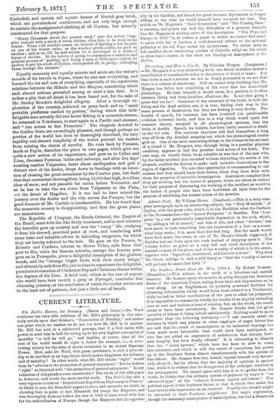CURRENT LITERATURE.
The Dublin Review, for January. (Burns and Oates.)—Dr. Ward continues his very able criticism of Mr. Mill's philosophy in the mas- terly article upon that thinker's "Foundation of Morality," and makes one point which we confess we do not see how Mr. Mill is to answer. Mr. Mill has said, in a celebrated passage, that if a God exists with power to send him to hell for acting up to his own highest conception of morality "to hell he will go," and implies, of course, that all the rest of the world would do right to follow his example, i.e., to ever- lasting misery for the sake of moral resistance to an unjust Supreme Power. How, asks Dr. Ward, with great pertinence, is such a proceed- ing to be justified on an hypothesis which makes happiness the ultimate end of morality ? In other words, what Mr. Mill thinks "right" would then be "adverse to the promotion of general enjoyment." But he defines ."
right" as identical with "the promotion of general enjoyment." Is any reduction of this paradox even conceivable? The whole of this able paper is, however, well worth the most careful study. The Dublin has also a 'very vigorous article on "Imperial and Republican Diplomacy in France," in which it uses the Benedetti papers to show, and succeeds, we think, in showing that, in point of fact, Bismarck did tempt the Emperor, and was thoroughly desirous before the war of 1866 to have acted with him for the redistribution of Europe, though the Emperor lost his opportu- nity by his timidity, and found the great German diplomatist no longer willing, at the time he would himself have accepted the bait. The article on Mr. Maguire's "Next Generation" and " The Coming Race" is amusing, and points out well the difficulties of a genuine Catholic like Mr. Maguire in writing satire of this description. "The Pope and Europe in 1872" is, of course, a paper in which we cannot find much to agree with, but it renders a well-deserved tribute to the spiritual gallantry of the old Pope under his misfortunes. We rather miss in this number those interesting studies of Catholic religious life which so often lend a charm to the often too theological atmosphere of the Dublin.






































 Previous page
Previous page